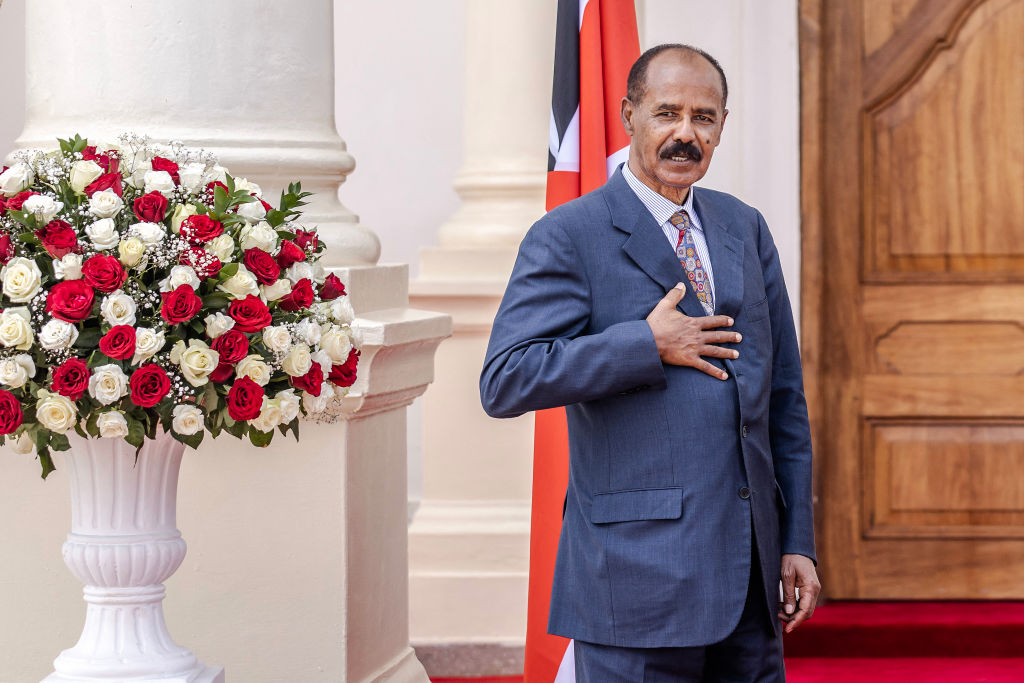Eritrea’s Iron-Fisted Leader Marks Three Decades in Power
ADF STAFF
Few countries are controlled as tightly by one man as is Eritrea.
Having recently marked 30 years of independence, Eritrea has never held a national election and has only ever known one head of state. Ranked as one of the most repressive countries in the world, it severely limits free speech, freedom of religion and demands decades of national service from its citizens.
At its center is President Isaias Afwerki, 77, the former guerilla leader of the country’s struggle for independence. Critics say he has created a “pariah state.”
“What North Korea means to the world … That’s what Eritrea means to Africa,” Ghanaian security analyst Fidel Amakye Owusu told DW.com. “It is reclusive, secretive and isolated.”
Following independence from Ethiopia––made official through a referendum in 1993––Eritrea drafted a constitution that protected civil liberties and enshrined democracy. It also had the beginnings of a free press and vibrant civil society. Members of its global diaspora returned home by the thousands to help build the nation.
Filmon Debru, now 37, was a child at the time and described the atmosphere as “euphoria.”
“There was real happiness,” he told Agence France-Presse. “Everything seemed to be turned towards the best.”
That hope began to evaporate in 1998 when the country returned to war with neighboring Ethiopia. Over the course of several years, Isaias tightened control by imprisoning critics and journalists without trial. The constitution was abandoned. A system of national service developed where young men are conscripted into the military at age 17 and remain there until at least age 40 in a policy the United Nations has termed “enslavement.”
“Isaias swept away the drafted constitution and his ever-shifting will became national policy,” wrote Horn of Africa scholar Yohannes Woldemariam in an essay for the London School of Economics.
Over the years, Eritrea retreated further inward. Its repressive system means it is one of the top producers of refugees in the world. Many who flee the country place their lives in the hands of brutal traffickers and board unsafe, crowded boats to cross the Mediterranean Sea. Eritrea’s aggressive, militarized foreign policy has resulted in clashes with each of its neighbors including, most recently, its involvement in Ethiopia’s civil war where Eritrean troops were accused of war crimes.
Domestically, Isaias has absolute power. There is no parliament or domestic opposition. Isaias’ directives are enforced by army generals who also control zones of the country and are allowed to profit from lucrative business interests, according to analysts. There is no succession plan, and it is unclear who will take power after Isaias.
“[Eritrea] is led by a man governed by his own self-interest for whom Eritreans have become a means to an end; that of extending his power and influence,” Woldemariam wrote.
With few allies on the international stage, Isaias has recently sought to deepen old alliances with China and Russia. In May, he made a four-day state visit to China and was feted by President Xi Jinping at Beijing’s Great Hall, where Xi toasted the “deep bond of friendship” between the two countries. On May 31, he met with President Vladimir Putin in his first state visit to Russia. Eritrea was one of only five countries to vote against a U.N. resolution calling for Russia to withdraw from Ukraine.
Owusu said Isaias gravitates toward other authoritarian leaders who will not press him on his human rights record or call for democratic reforms. “Those are going to be his natural allies,” Owusu told DW.com. “He can identify with Putin, who has left office and come back and, for the foreseeable future, is likely to be in charge of Russia.”
Many Eritreans now living abroad wonder how a country that began with so much promise has been handed over to the control of one man.
Bereket Habte Selassie, a legal scholar who chaired the commission that wrote Eritrea’s constitution, said he still does not know how it all went wrong. “Isaias has made it clear that he will remain president as long as he can; until he is forced out,” he wrote in 2020. “A question that everybody asks — one for which there has been no clear and unequivocal answer thus far —is: How did Isaias succeed in convincing everybody to let him do as he pleased, whatever he wanted for all those years?”


Comments are closed.